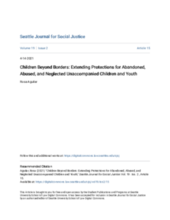Displaying 331 - 340 of 2509
"Researchers now estimate that more than 40,000 children in the United States have lost a parent to Covid-19," says this article from Vox.
This study aimed to better understand the role that Court-Appointed Special Advocates (CASAs) play in the lives of transition-age youth (TAY) by asking participants about the nature of their relationships with their CASAs, and the extent to which their CASAs helped prepare them for independent living.
"During the pandemic, video chats replaced in-person visits between parents and their children placed in foster care" says this article from the Marshall Project. "The effects could linger for years."
This article argues that the U.S. Congress should make changes to extend protections under Special Immigrant Juvenile Status (SIJS). These implementations would give effect to the legislative intent behind SIJS, which is to protect the particularly vulnerable group of unaccompanied children and youth.
This article from CNN shares the story of a 31-year-old Salvadoran mother in a shelter for deported migrants in the Mexican border city of Reynosa whose 12 and 16 year olds sons have crossed into the United States unaccompanied.
This article highlights a new report from Bethany Christian Services, which is the first large-scale study of its foster care work based on a racial breakdown of the children, reviewing hundreds of cases from programs in four cities — Atlanta, Philadelphia, Detroit and Grand Rapids, Michigan.
In this webinar the speakers discussed the implementation experiences and emerging lessons of COVID-19 response strategies of seven programmes that prioritize nurturing care and early childhood development in their work.
In this webinar, panelists will discuss the implementation experiences and emerging lessons of COVID-19 response strategies of seven programmes that prioritize nurturing care and early childhood development in their work.
A systematic review was conducted to examine the effectiveness of interventions and practice models for improving health and psychosocial outcomes of young people in residential care and to identify relevant knowledge gaps.
This study used community‐participatory qualitative methods to deeply explore the lived experiences and emotional repercussions of family separation and reunification.

